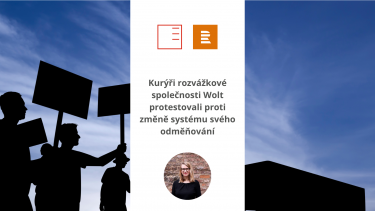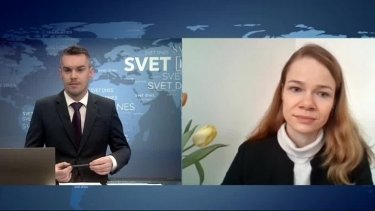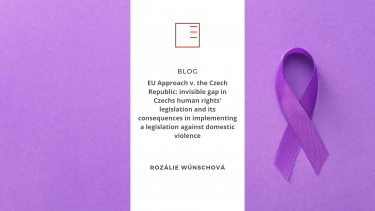EU MONITOR | THREE RESPONSES TO DISINFORMATION IN THE EUROPEAN UNION
Disinformation and foreign interference have been concerns in global politics for centuries, but social media algorithms have made the current threat more dire as they amplify content based on human frailties such as our obsession with negativity and outrage. Russian interference in the 2016 US federal election and other elections and referenda in at least twenty countries between November 2016 and April 2019, including the Brexit referendum, the French and German elections, and the Ukrainian power grid cyber-attacks, have highlighted the potential for foreign governments to alter the results of an election or undermine democracies using social media and other means. Writes Jakub Ferenčík in his last EU MONITOR.
Show more PDF
POLICY PAPER: Finding Transatlantic Unity in Times of Conflict 2022. Transatlantic Policy Forum in Review
Our researchers Danielle Piatkiewicz and Hugo Blewet-Mundy have written a policy paper on "Finding Transatlantic Unity in Times of Conflict 2022. Transatlantic Policy Forum in Review" which aims to outline action points and proposals that the Transatlantic Partnership should adopt.
Show more PDFINVITATION | EU-Pacific Talks: Europe and the Indo-Pacific: Trade relations with the Indo-pacific
We would like to invite you to a debate "EU-Pacific Talks: Europe and the Indo-Pacific: Trade relations with the Indo-pacific", which will take place on 21 February at 13:00 online on our Facebook page.
Show more
Český rozhlas Plus: Couriers of the delivery company Wolt protested against the change of the pay system
This is the second time the delivery company's couriers have gone on strike since the beginning of the year. Our researcher Klára Votavová explained the reasons for the strike on Český Rozhlas Plus. The couriers are bothered by the drop in earnings and describe the remuneration system itself as non-transparent. The European Parliament is also concerned with increasing the protection of couriers and so-called platform workers in response to the emergence of a new market segment.
Show morePOLICY PAPER | QMV in CFSP: Impending necessity or resurfacing utopia?
Miroslava Pisklová writes about a discussion on potential broadening of the qualified majority voting (QMV) system to more of the remaining policy areas in the Council of the EU in which it is not yet used, namely the EU´s Common Foreign and Security Policy (CFSP) that has recently gained momentum. This publication aims to analyse the advantages and disadvantages of introduction of the QMV in CFSP of the EU with a focus on the potential impact on smaller member states.
Show morePOLICY PAPER | Shifting the gender quota debate from underrepresentation of women to overrepresentation of men within diplomacy
Ivana Uličná writes about the fact that even though some progress has been made towards gender equality in diplomacy, women remain underrepresented in ambassadorial positions worldwide. Quotas have been effective in boosting nominal representation of women but critiques focused on quotas being tokenistic and harming meritocracy place a double burden on women. However, even the current system is not meritocratic, as men benefit from a historical advantage and assumed competence, while women must justify their presence, prove their worth and disprove gender stereotypes.
Show moreTA3: The EU as a whole does not act on the issue of arms supplies to Ukraine, it is a decision of the member states
Zuzana Stuchlíková, our research associate, commented for TA3 on Ukrainian President Volodymyr Zelenskyj’s summit at the European Union.
Show more
BLOG: EU Approach v. the Czech Republic: invisible gap in Czechs human rights' legislation
Rozálie Wünschová writes in her blog that the Czech Republic is one of only two EU countries where corporal punishment of children is still legally permitted. Together with Slovakia, this puts the Czech Republic behind not only the Nordic countries, where corporal punishment was banned in the last century but also countries such as Turkmenistan, which adopted protective legislation in 2007.
Show more PDFiDNES: The EU will turn off your appliances. Lies about the Green Deal have taken over the internet in the Czech Republic
Our junior researcher Tatiana Mindeková conducted an analysis of the narratives around the Green Deal in the Czech and Slovak information scene. What kind of misinformation about the EU climate policy is being voiced in mainstream and alternative media? Tatiana Mindeková commented on the results of her research for iDNES.cz.
Show moreBLOG | European Media Freedom Act on the case of Slovenia: Has Slovenia overtaken the European Commission with its new law?
In September 2022, the European Commission put forward a proposal for a new media regulator - the European Media Freedom Act. Slovenia is one of the most struggling EU countries in terms of media freedom and independence. In the summer of 2020, the Janša government proposed a media-focused law that would increase the state's influence over Slovenia's national press agency and limit its funding of the public broadcaster RTV. Has Slovenia's new law put the European Commission ahead of the game? That is what our intern Klára Landová discusses in her blog.
Show moreStaroměstské náměstí 4/1
Prague 1 - Staré Město
110 00
tel.: +420 212 246 552
email: europeum@europeum.org
https://www.europeum.org









